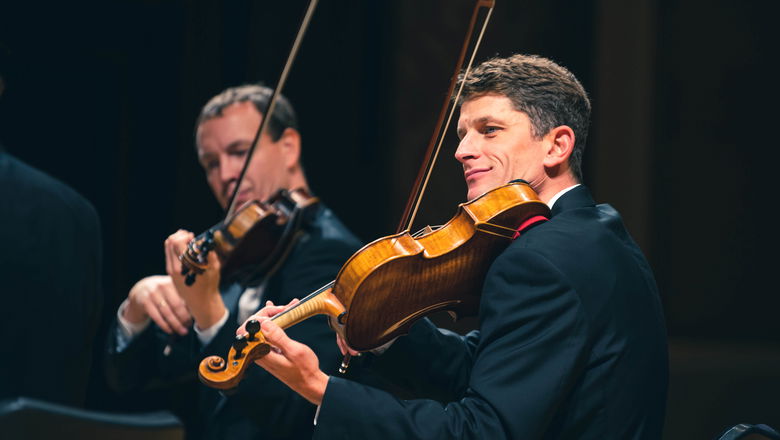The Bennewitz Quartet, bearing the name of the violinist and director of a music conservatory in Prague Antonín Bennewitz since 1998, is one of the top international chamber ensembles, a status confirmed not only by their victories in two prestigious competitions – Osaka in 2005 and Prémio Paolo Borciani, Italy in 2008, but also by the acclaim of the critics. As early as 2006, the German Frankfurter Allgemeine Zeitung wrote: “... the music was remarkable not just for its clarity of structure, but for the beautiful tonal palette and purity of intonation in its execution. Only very rarely does one experience such skilfully crafted and powerful harmonies... Great art.” The ensemble has received various awards on the Czech music scene as well. In 2004 the quartet was awarded The Prize of the Czech Chamber Music Society and in 2019 the four musicians won the Classic Prague Award for the Best Chamber Music Performance of the year.
The quartet currently performs at major venues both in the Czech Republic and abroad (Wigmore Hall London, Musikverein Wien, Konzerthaus Berlin, Rudolfinum and others), and is regularly invited to festivals such as the Salzburger Festspiele, Luzerne Festival or the Prague Spring. The group has had the privilege of working with the outstanding artists: Jean-Yves Thibaudet, Alexander Melnikov, Vadim Gluzman, Isabel Charisius and others.
The Bennewitz Quartet especially enjoys playing and performing on the Czech domestic music scene. Particular highlights have included their cooperation with the Czech Philharmonic Orchestra and its conductor Jiří Bělohlávek for a performance of Bohuslav Martinů’s Concerto for String Quartet and Orchestra. The group has made a recording of both quartets by Leoš Janáček for Czech Television in the unique space of Villa Tugendhat in Brno. The Czech Radio regularly records major concerts of the quartet.
The members of the quartet put a lot of stress on the inspiring and sometimes challenging choice of their concert repertoire. In 2012 and 2015, the ensemble performed in a sole evening the complete of Bartók’s six string quartets in Maggio Musicale Fiorentino and in Swedish Upsala. In 2014, the four presented a premiere of The Songs of Immigrants by Slavomír Hořínka in Konzerthaus Berlin. In 2019 the quartet added a new CD in its discography featuring the music of the persecuted Jewish composers H. Krása, V. Ullmann, E. Schulhoff and P. Haas on the Supraphon label.
In the 2023/2024 season, the Bennewitz Quartet will return to a number of European venues (Stuttgart, Mannheim, Heidelberg, Linz, Bilbao) and will make their debuts in Klagenfurt, Darmstadt and Duisburg. The quartet will again perform in the United States and Canada, and will continue its various concert projects in the Czech Republic, including a collaboration with the Dvořák Prague Festival. The ensemble is currently preparing the release of a new CD featuring string quartets by “those who used to play together” – Haydn, Mozart, Vaňhal and Dittersdorf.
Since 1998 the quartet bears the name of the violinist and director of a music conservatory in Prague, Antonín Bennewitz (1833‒1926) who contributed greatly to the establishment of the Czech violin school. The most significant musicians who count among his disciples are Otakar Ševčík and František Ondříček and above all Karel Hoffman, Josef Suk and Oskar Nedbal who, under Bennewitz’s influence, formed the famous Bohemian Quartet.


